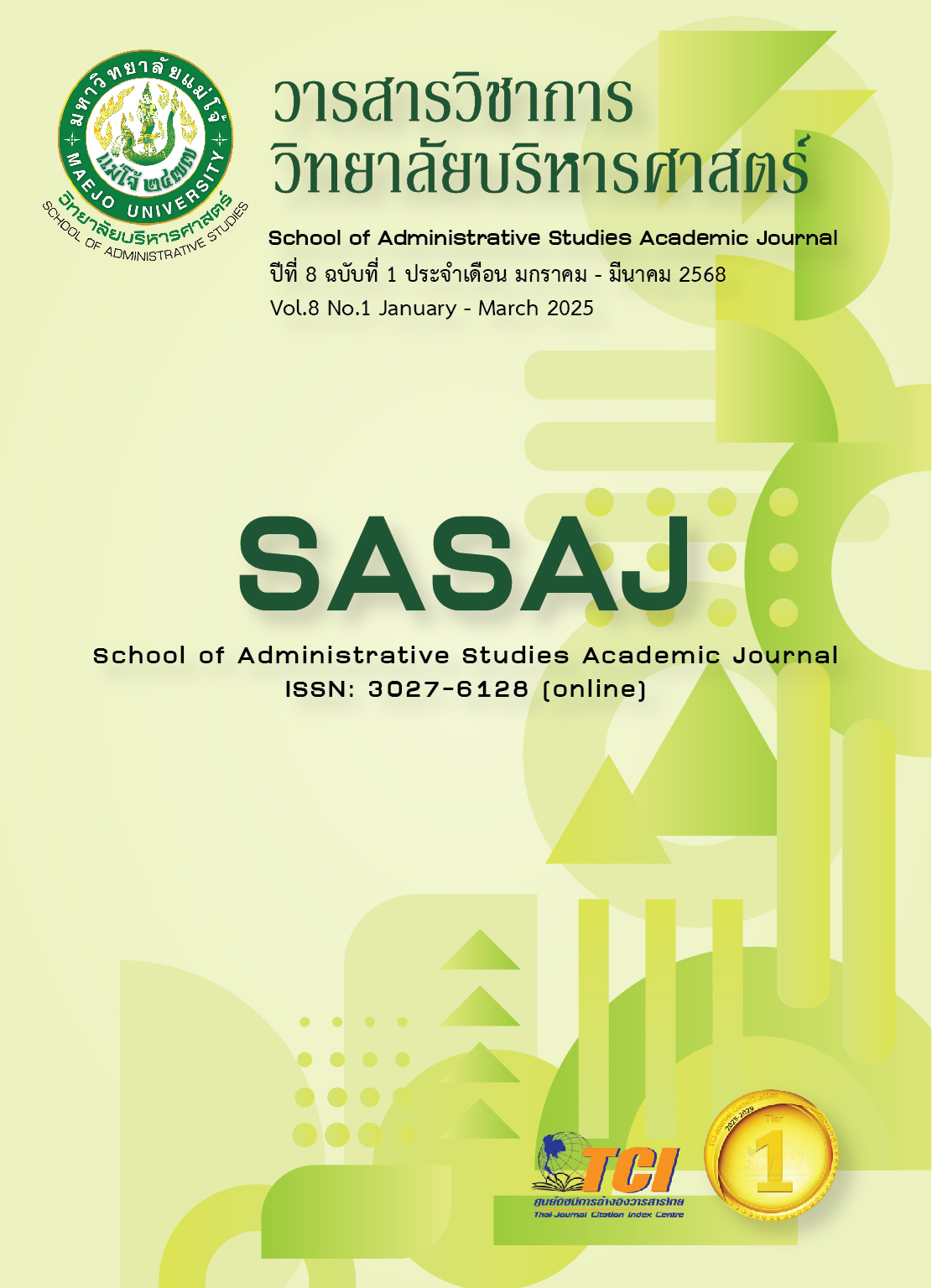การวิเคราะห์สมการโครงสร้างของการจัดการความรู้ที่ส่งผลต่อผลการดำเนินงานขององค์กร ผ่านการพัฒนาบุคลากร ในอุตสาหกรรมโรงแรมของประเทศไทย
Main Article Content
บทคัดย่อ
การวิจัยนี้มีวัตถุประสงค์เพื่อ 1) เพื่อศึกษาโครงสร้างการจัดการความรู้ การพัฒนาบุคลากร และการดำเนินงานชององค์กร 2) เพื่อสร้างแบบจำลองโครงสร้างการจัดการความรู้ การพัฒนาบุคลากร และการดำเนินงานชององค์กร 3) เพื่อตรวจสอบแบบจำลองโครงสร้างการจัดการความรู้ การพัฒนาบุคลากร และการดำเนินงานชององค์กร ในอุตสาหกรรมโรงแรมของประเทศไทย 4) เพื่อศึกษาแนวทางการส่งเสริมการจัดการความรู้ ในอุตสาหกรรมโรงแรมของประเทศไทย โดยผู้วิจัยใช้ระเบียบวิธีวิจัยแบบผสมผสานทั้งระเบียบวิธีวิจัยเชิงปริมาณ (Quantitative Research) และระเบียบวิธีวิจัยเชิงคุณภาพ (Qualitative Research) โดยในการวิจัยเชิงปริมาณได้รวบรวมแบบสอบถามจากบุคลากรโรงแรมของระดับ 4 ดาวในประเทศไทย จำนวน 418 ตัวอย่าง โดยใช้การเลือกกลุ่มตัวอย่างแบบบังเอิญ (Accidental Sampling)
ผลการศึกษาพบว่า ผลการวิเคราะห์องค์ประกอบเชิงยืนยัน (Confirmatory Factor Analysis: CFA) ของการจัดการความรู้ ที่ส่งผลต่อผลการดำเนินงานขององค์กร ผ่านการพัฒนาบุคลากรในอุตสาหกรรมโรงแรมของประเทศไทย มีความเหมาะสมสอดคล้องกับข้อมูลเชิงประจักษ์ การจัดการความรู้ มีความสัมพันธ์ทางตรงเชิงบวกกับการพัฒนาบุคลากร การพัฒนาบุคลากร มีความสัมพันธ์ทางตรงเชิงบวกกับการดำเนินงานขององค์กร และ การจัดการความรู้ มีความสัมพันธ์ทางอ้อมเชิงบวกกับการดำเนินงานขององค์กร โดยผ่านการพัฒนาบุคลากร เช่นเดียวกับผลศึกษาการวิจัยเชิงคุณภาพ จากการสนทนากลุ่ม (Focus Group) พบว่า การจัดการความรู้ จะช่วยพัฒนาบุคลากร 3 ด้าน ได้แก่ 1) สมรรถนะการนำเสนอถ่ายทอดความรู้ 2) สมรรถนะการเป็นโค้ช และ 3) สมรรถนะการพัฒนาจากการมีทัศนคติที่ดี ส่งผลให้การดำเนินงานขององค์กรมีประสิทธิภาพมากขึ้น
Article Details

อนุญาตภายใต้เงื่อนไข Creative Commons Attribution-NonCommercial-NoDerivatives 4.0 International License.
ลิขสิทธิ์
เอกสารอ้างอิง
ปัญญา ธีระวิทยเลิศ. (2016). เทคนิคการสนทนากลุ่ม (Focus Group) ที่มีประสิทธิภาพ. วารสารสถาบันวิจัยญาณสังวร มหาวิทยาลัยมหามกุฏราชวิทยาลัย, 7(2), 284-289.
Al-Hakim, L. A. Y., & Hassan, S. (2014). Who are the crew members on implementation of knowledge management strategies to enhance innovation and improve organizational performance. Journal of Resources Development and Management, 3, 54-63.
Barkema, H. G., Baum, J. A., & Mannix, E. A. (2002). Management challenges in a new time. Academy of Management Journal, 45(5), 916-930.
Bollen, K. A. (1989). Structural equations with latent variables. Oxford: 1989 John Wiley & Sons, Inc.
Dirks, K. T., & Ferrin, D. L. (2002). Trust in leadership: Meta-analytic findings and implications for research and practice. Journal of Applied Psychology, 87(4), 611.
Drucker, P. F. (1988). The Coming of the New Organization. Harvard Business Review, 66, 45-53.
Dworkin, S. L. (2012). Sample Size Policy for Qualitative Studies Using In-Depth Interviews. Archives of Sexual Behavior, 41(6), 1319-1320. doi:10.1007/s10508-012-0016-6
Guion, L., Diehl, D., & McDonald, D. (2011). Triangulation: Establishing the Validity of Qualitative Studies. EDIS, 2011(8), 1-3. doi:10. 32473/edis-fy394-2011
Holjevac, I. A. (2003). A vision of tourism and the hotel industry in the 21st century. International Journal of Hospitality Management, 22(2), 129-134.
Jørgensen, F., Boer, H., & Laugen, B. T. (2006). CI Implementation: An Empirical Test of the CI Maturity Model. Creativity and Innovation Management, 15(4), 328-337. https://doi.org/10.1111/j.1467-8691.2006.00404.x
Kim, T. T., Yoo, J. J. E., & Lee, G. (2011). The HOINCAP scale: measuring intellectual capital in the hotel industry. The Service Industries Journal, 31(13), 2243-2272.
Kline, R. B. (1998). Structural equation modeling. New York, NY: Guilford.
Krueger, R. A., & Casey, M. A. (2002). Designing and conducting focus group interviews. Retrieved from https://www.eiu.edu/ihec/Krueger-FocusGroupInterviews.pdf
Nyumba, T. O., Wilson, K., Derrick, C. J., & Mukherjee, N. (2018). The use of focus group discussion methodology: Insights from two decades of application in conservation. Methods in Ecology and evolution, 9(1), 20-32.
Steers, R. M., & Porter, L. W. (1974). The role of task-goal attributes in employee performance. Psychological Bulletin, 81(7), 434.
Suveatwatanakul, C. (2022). Service quality development to strengthen visa service company’s brand loyalty in Thailand. The Golden Teak: Humanity and Social Science Journal, 28(4), 194-206.
Suveatwatanakul, C. (2023). A study of employee experience factors among cabin crew of a full-service airlines in Thailand. The Golden Teak: Humanity and Social Science Journal, 29(3), 161-177.
Takeuchi, H., & Nonaka, I. (2000). Classic work: Theory of organizational knowledge creation. In D. Morey, Maybury, M. T., & Thuraisingham, B. (Eds.), Knowledge management: classic and contemporary works (pp. 139-182). Massachusetts, MA: The MIT Press.
Young-Thelin, L., & Boluk, K. (2012). A case study of human resource practices in small hotels in Sweden. Journal of Human Resources in Hospitality & Tourism, 11(4), 327-353.


